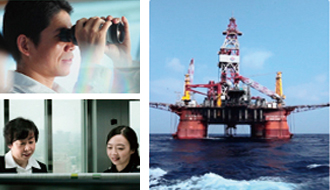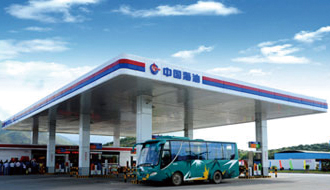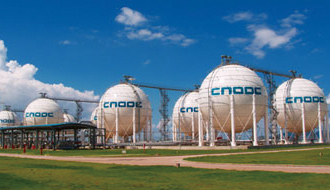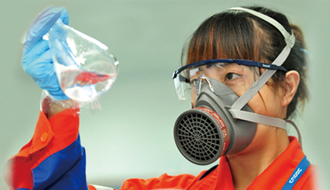| Home |
|

News Releases
CNOOC KF Oilfield Project: The Choice of Ten Thousand Ugandans |
|||
|
|||
Near the breathtakingly blue water of the Albert Lake in Uganda lies the Kingfisher oilfield, whose development is pushed forward by CNOOC Uganda. To develop the project, the decisive factor is to get the Environmental and Social Impact Assessment (ESIA) permission through the hearing. What are their opinion of CNOOC? Could the Chinese company get the permission? At the time, the neighborhood was affected by Ebola, and efforts were made to prevent infection. Despite of this, families of local residents arrived at the site, and so were representatives from Uganda's Petroleum Bureau, Environmental Protection Agency, regional governments, NGOs and foreign diplomats in Uganda. The company expected 5,000 participants, but there came tens of thousands! A Ugandan grandma said, "I hope that CNOOC's Kingfisher project can be developed as soon as possible, so that more opportunities can be given to local communities." What she said is what tens of thousands of Ugandans voted for. "The Albert Lake is still breathtaking,” exclaimed Professor Grace Bantebya from Makerere University of Uganda, who was looking far into the clear blue water. Lake Albert is Uganda's second largest lake and one of the main sources of the Nile as well. Next to the beautiful plateau lake is the Kingfisher oilfield operated by CNOOC Uganda Limited (“CNOOC Uganda”). During the seven years, CNOOC, not only as a keeper of the serene lake here, but also as a Chinese central State-owned enterprise with responsibility, has nurtured the friendship between China and Uganda, writing a good story in Africa again about advancing the Road and Belt Initiative and furthering the cooperation with Africa. On the morning of June 19, 2019, Professor Bantebya, the Presiding Officer, dressed up in traditional Ugandan costume, travelled to Hoima District a day before the event and made preparations for a grand gathering. Uganda has strict requirements for the environmental protection level of oilfield development projects. No projects can be launched without the ESIA permission. The engagement of local residents and NGOs in the assessment through the hearing is exactly the decisive factor for whether or not the ESIA can be approved. If attendees of the hearing raise objections to the ESIA of a project, then the oil company has to make adjustments and amendments over and over again until all sides feel satisfied. Thereupon, the project can be deemed as winning the public support. This is often a time-consuming process. Some international oil companies were strongly rejected at hearings. But Professor Bantebya was calm, looking unworried. She held confidence in performing the task of hosting the hearing successfully, “I have confidence in CNOOC because it is a big international company that understands the business.” Keep Public Hearing Venues Safe and Green CNOOC Uganda would hold two hearings this time, expected to welcome thousands of local people and NGO members. To ensure that the two hearings proceed safely and smoothly, the company had made thorough preparations. The second hearing would take place in Kikuube District two days later, and the venue for it at the Kikkube primary school had been set up already. The southwestern Uganda was plagued by Ebola at the time, and the oilfield at the western lake region was not far from the affected area. To prevent Ebola infection, the well-armed Ebola quarantine officers and disinfection medical staff stood guard at the entrances of the two venues, and policemen and soldiers of the Ugandan army, who were responsible for maintaining order, arrived one day ahead of the schedule to guard major crossings and all corners of the venues. “We should ensure the safety and environmental friendliness of the hearing venues, just like what we do for the production site,” said Cui Yujun, Vice President, CNOOC Uganda. Considering that each hearing drew as many as 5,000 or more than ten thousand people, the company hired a waste management contractor to sort and recycle all kinds of waste at the venues, and provide mobile toilets. To cope with the possible emergencies, the medical station and ambulances, fire fighting trucks and trained firefighters were also offered. Many villages near the oilfield still have no electricity. Many days ago, to ensure the news of the hearing reach every single resident, CNOOC Uganda hired a community publicity truck which drove round the villages, informing all villagers of the time and place of the hearing. Some felt puzzled and asked, “Isn't it easier to have fewer attendees?” “This is the respect that CNOOC shows for the local people,” Ronald Kaija, Senior Community Relations Supervisor, CNOOC Uganda “and we welcome all residents to supervise and comment our work.” Over Ten Thousand People Came The day for the first hearing finally came. At 7am of that day, dozens of buses hired by CNOOC Uganda arrived at the villages in succession. Villagers at all ages, dressed in festive costumes, boarded buses in order and set off to the hearing venue. Also arriving at the scene were representatives of Uganda’s Petroleum Bureau, Environmental Protection Agency, regional governments and NGOs, as well as foreign diplomats in Uganda. How was the work of this Chinese oil company? They all waited to see. In the end, the hearing venue ushered in over ten thousand people, more than doubling what they had expected. This number hit a new high in the history of hearings for oil projects. The hearing officially began at 8am. Peninah Aheebwa, Technical Director of Uganda Petroleum Bureau, Robert Kasande, Permanent Secretary of the Ministry of Energy and Mineral Development, and Tom Okurut, Director General of the EPA, respectively recognized the efforts CNOOC had made in furthering environmental protection and social sustainability in Uganda in the past few years. Subsequently, Cui Yujun, Vice President of CNOOC Uganda, introduced to the attendees the development plan for the Kingfisher Oilfield and the measures for reducing its impact on the local society and environment. Professor Bantebya and the audience, while listening carefully, now took notes, now applauded warmly. Most of the residents present didn’t speak English, so CNOOC Uganda hired three interpreters who were proficient in different languages to convey what the government officials and the company's leaders said to everyone in a timely manner. The afternoon saw the hearing go into the public inquiry session, the most challenging and busiest part of the day. More than ten thousand Ugandan people gathered below the stage. “We didn't expect so many people,” Aminah Bukenya, CNOOC Uganda said frankly, “I was confident, but still somewhat felt nervous in face of more than ten thousand pairs of eyes.” What would they say? Would they speak too strong and make it hard for us to respond? Would they become too emotional and agitated to be pacified? Questions like these were completely out of the control of CNOOC Uganda. However, this worry turned out to be unnecessary. “Now you can give us your opinions.” Hardly had the host finished when many hands were put up. Professor Bantebya acclaimed, “I had planned to spend some time in maintaining order, but it was really beyond my expectation that the hearing attended by over ten thousand people could be so well-ordered.” With a calm attitude, the representatives expressed their opinions pleasantly. A local grandma said that she felt warm when seeing CNOOC people, and a young man, Ronald Kaija, who was a local CNOOC employee, once visited her and listened to her comments and suggestions on CNOOC, as well as her expectations for social programs. This young man served as a community liaison officer, responsible for communicating with the local people so as to understand and satisfy their needs in time. Time flew in a friendly and harmonious atmosphere. Professor Bantebya switched between English and the native language, keeping the overall rhythm under control. Throughout the inquiry session, no sharp criticisms were heard. Hope the Project Can Be Developed Soon Behind the success of the two hearings was the seven-year-long preparation of CNOOC. Since its arrival in Uganda in 2012, CNOOC has, with practical actions, built the image of a responsible international oil company among the local residents. From environmental protection to people’s livelihood and to education, CNOOC has built a series of “bridges” connecting two peoples of China and Uganda. CNOOC adopted the highest environmental standards in Uganda, strictly followed relevant laws and regulations of this country, and strove to implement the best practice guidelines in the industry worldwide. CNOOC Uganda used the IFC Performance Standards on Environmental and Social Sustainability, which are highly recognized in the international arena and more systematic, to implement the ESIA, and took them as the environmental standards for the subsequent development of oilfields. In the oilfield area, the company did a lot of work in collecting and organizing environmental baseline data, and invited ESIA experts with backgrounds in various sectors, such as wetland, forestry, hydrology, soil, biodiversity, waste management, air, noise, community security and transportation, from across the world, to assess the environmental and social factors in the aspects concerning oilfield development and environmental protection and work out measures to reduce the impact of these factors. In 2015, CNOOC built a cross-cliff highway in Buhuka Village to the east of the KF oilfield, turning the deep chasm that had existed for thousands of years into a thoroughfare and changing the life of local residents with this first and only highway in the village. To improve the academic performance of local teenagers, CNOOC Uganda has rolled out several scholarship programs, and subsidized the pupils and students for six straight years. Facilitated by the CNOOC Best Performers Award (BPA), the number of students who scored A in UCE exams in Hoima has increased from 13 in 2012 to nearly 400, reported the local media. In Uganda, the UCE (Uganda Certificate of Education) is used to prove that the student is qualified for graduation from the junior high school. To make it possible for local residents to see doctors when they are sick, CNOOC Uganda, under the support of Chinese Enterprises Chamber of Commerce in Uganda and Chinese Uganda-aid medical teams, has carried out the activity of charity clinics for several times, and by cooperating with local NGOs, launched many AIDS prevention campaigns. In terms of training professionals, CNOOC Uganda spares no efforts even more. In July 2018, the company opened a welder training course, one of the student Julies Sakarbi won the silver metal of world skill competition in Africa region. Since 2012, CNOOC Uganda limited has subsidized eight local college students for their further studies in China University of Petroleum, all the students have graduated and are making their contribution to Uganda oil and gas industry. At the end of 2017, another seven Ugandan engineers were sent to China to work with Chinese colleagues on the design. “I hope that CNOOC's Kingfisher project can be developed as soon as possible, so that more opportunities can be given to local communities,” said that Ugandan grandma. What she said is also what the ten thousand Ugandans voted for. Besides the project in Uganda, CNOOC has set other examples for the international cooperation on energy on the Belt and Road. It planted one million mangrove trees in Indonesia, built power plants and water treatment works in Iraq, provided jobs for native Americans of Canada in North America, and helped people in Calgary after the floods. Mutual understanding leads to people-to-people bond which further can be a booster for cooperation between two countries. CNOOC, as a central State-owned enterprise, always bears in mind its responsibility of establishing Chinese companies' image, and acts on it, building bridges that link people around the world. |
| Print Close Window |





